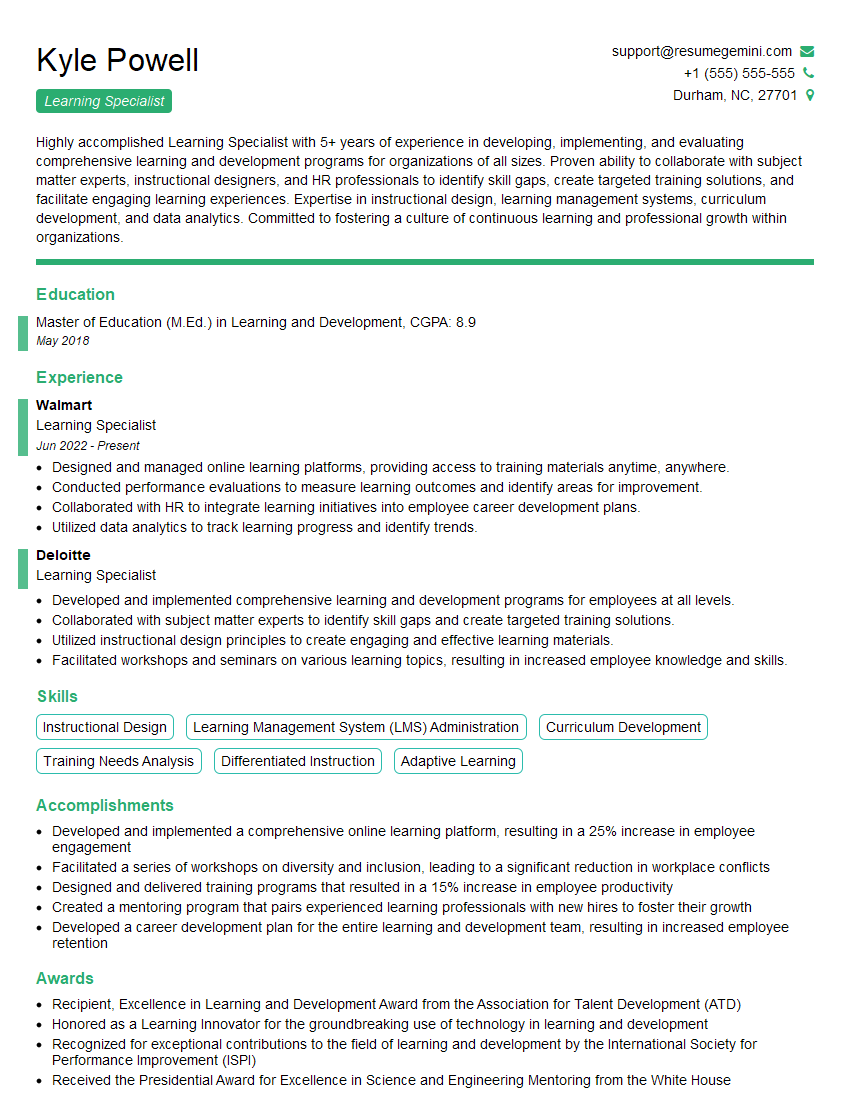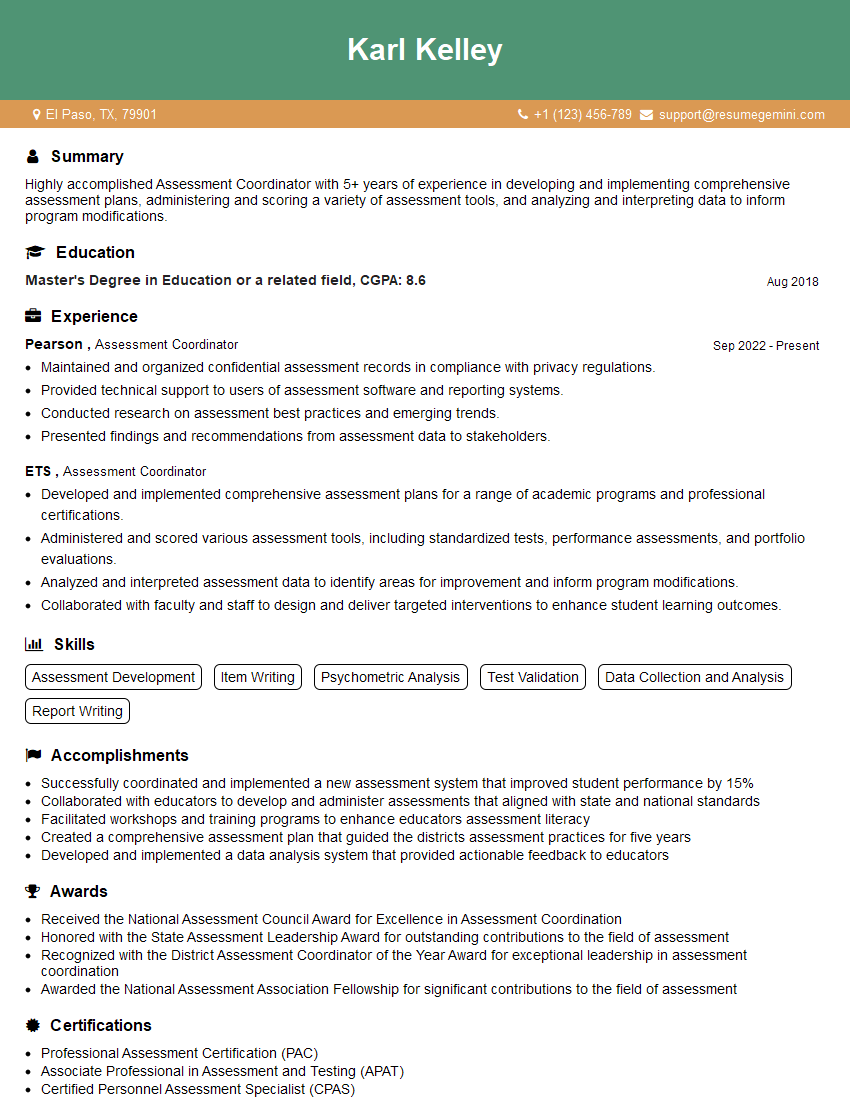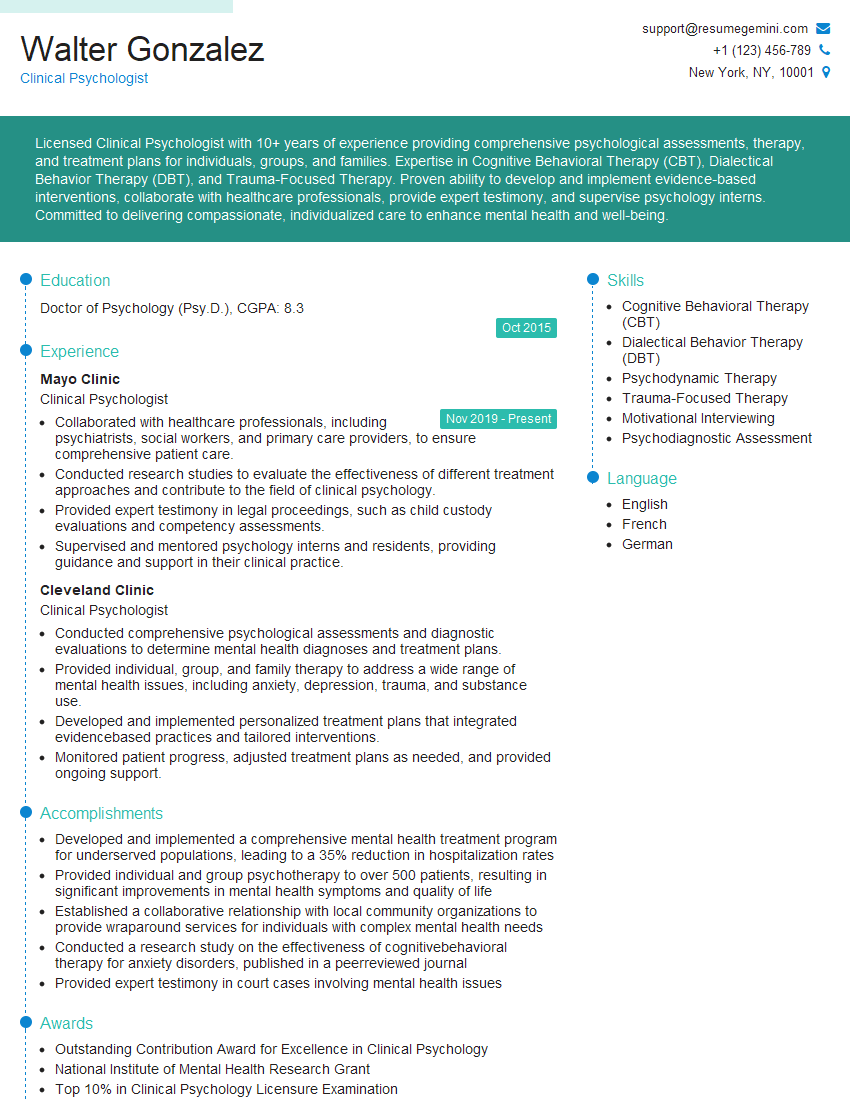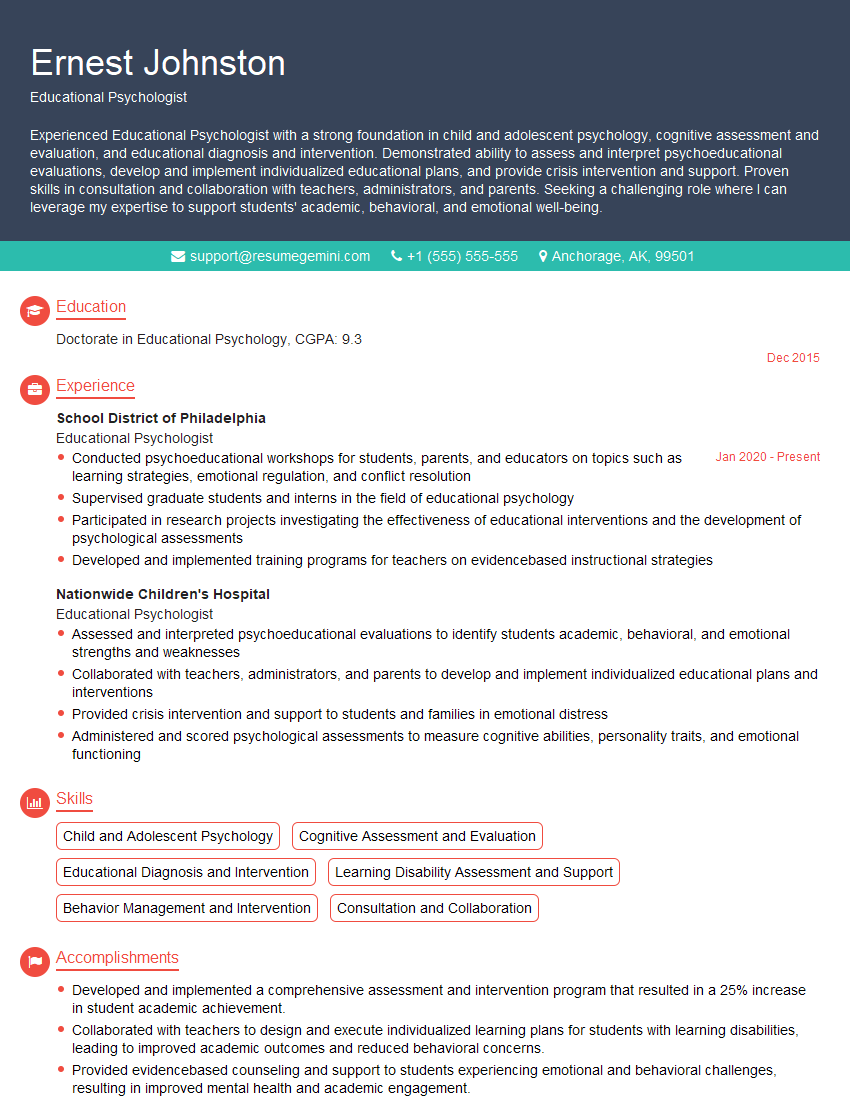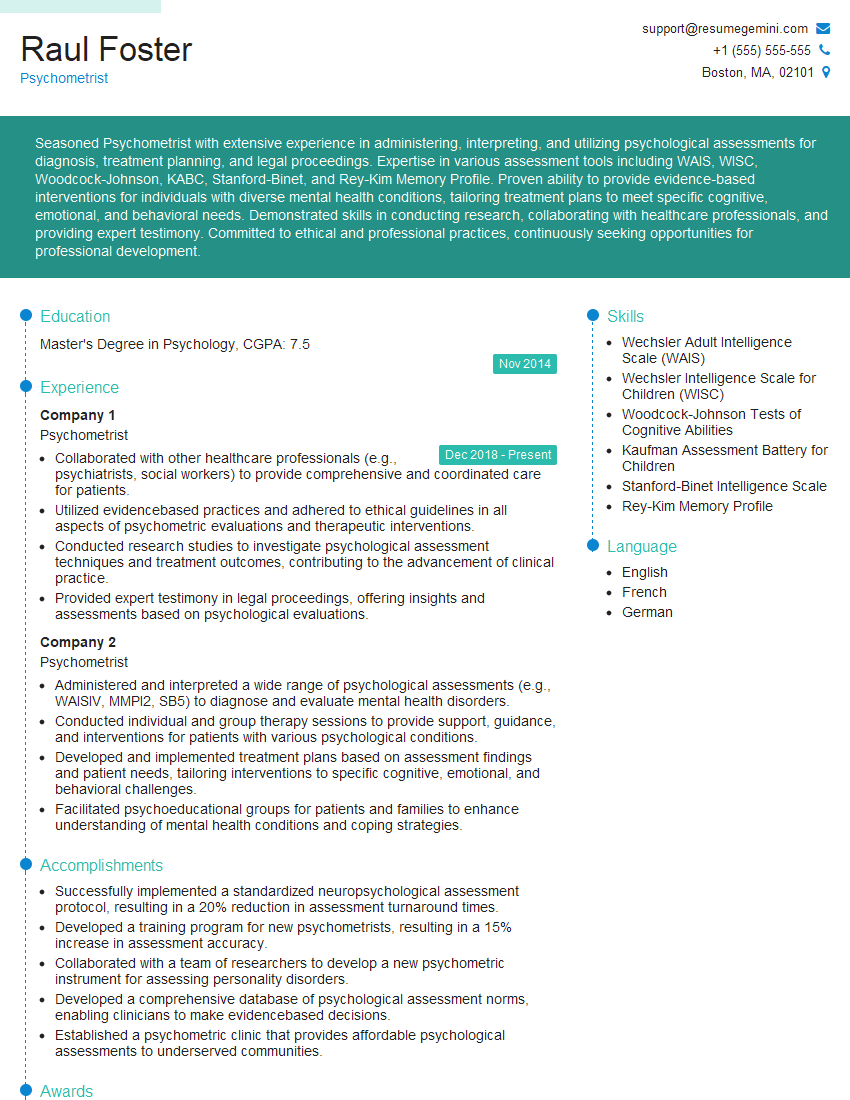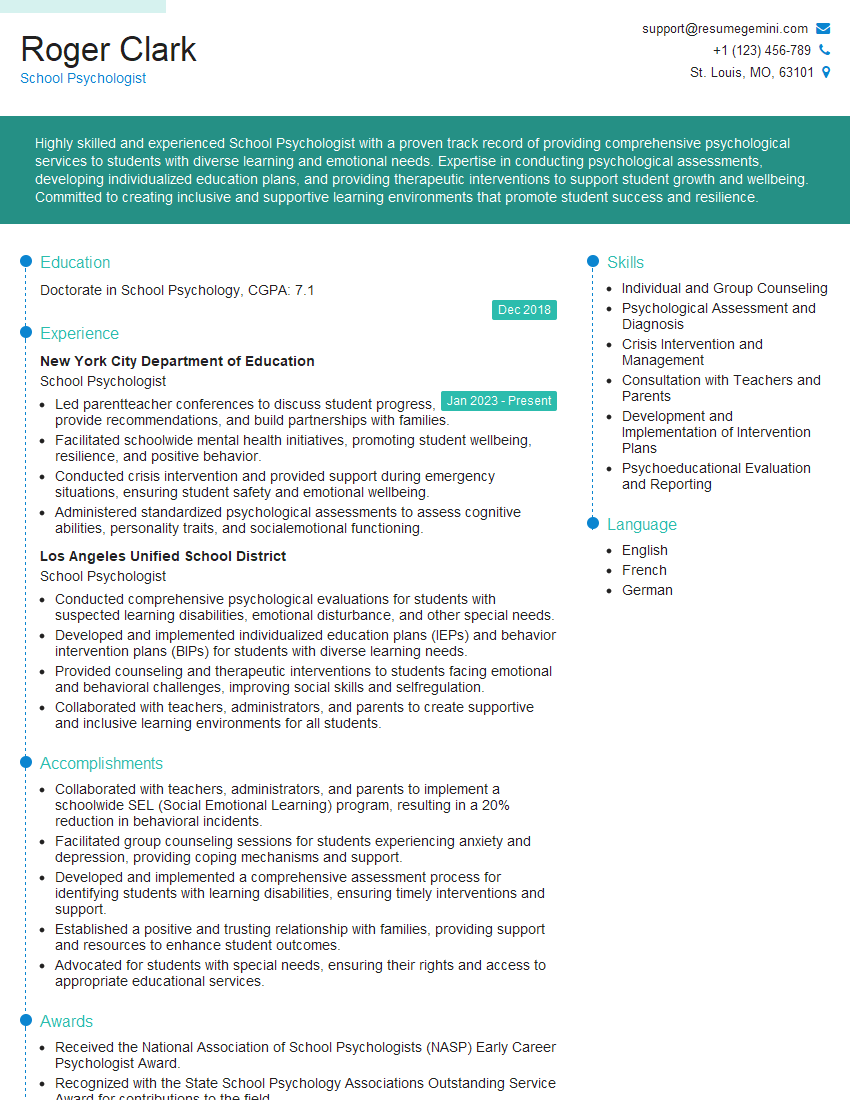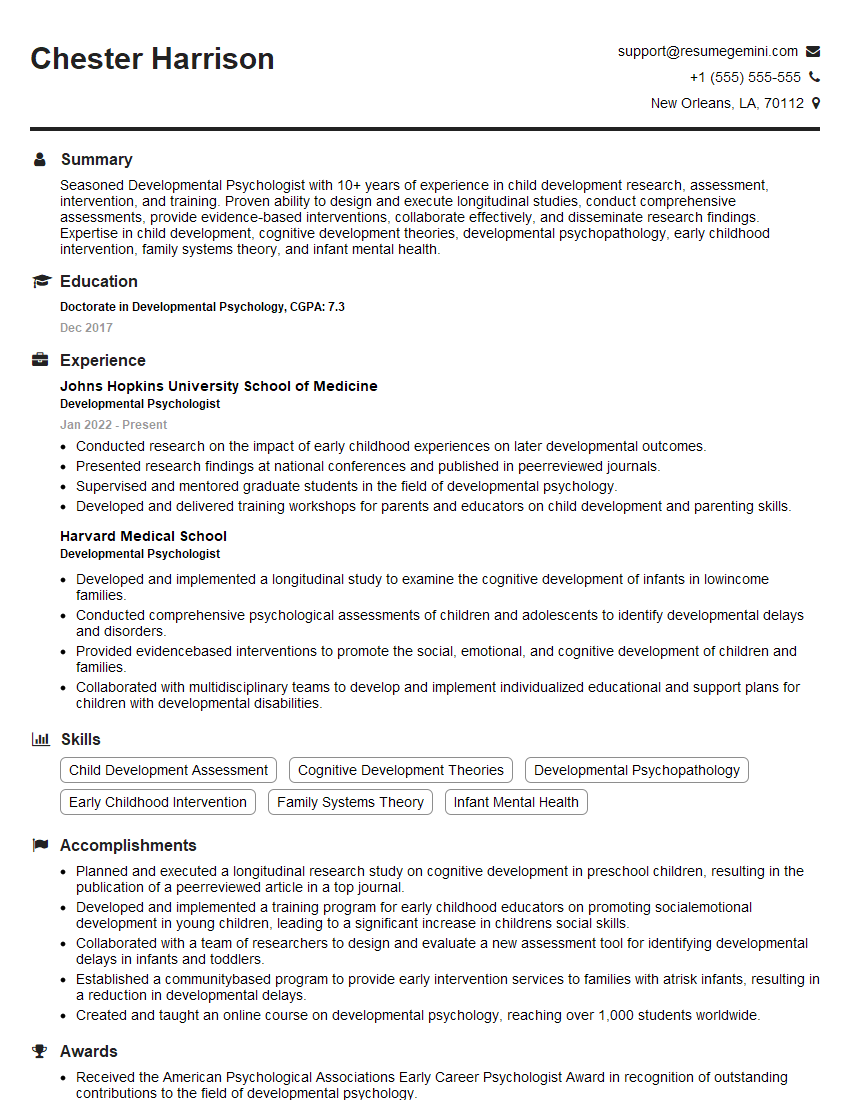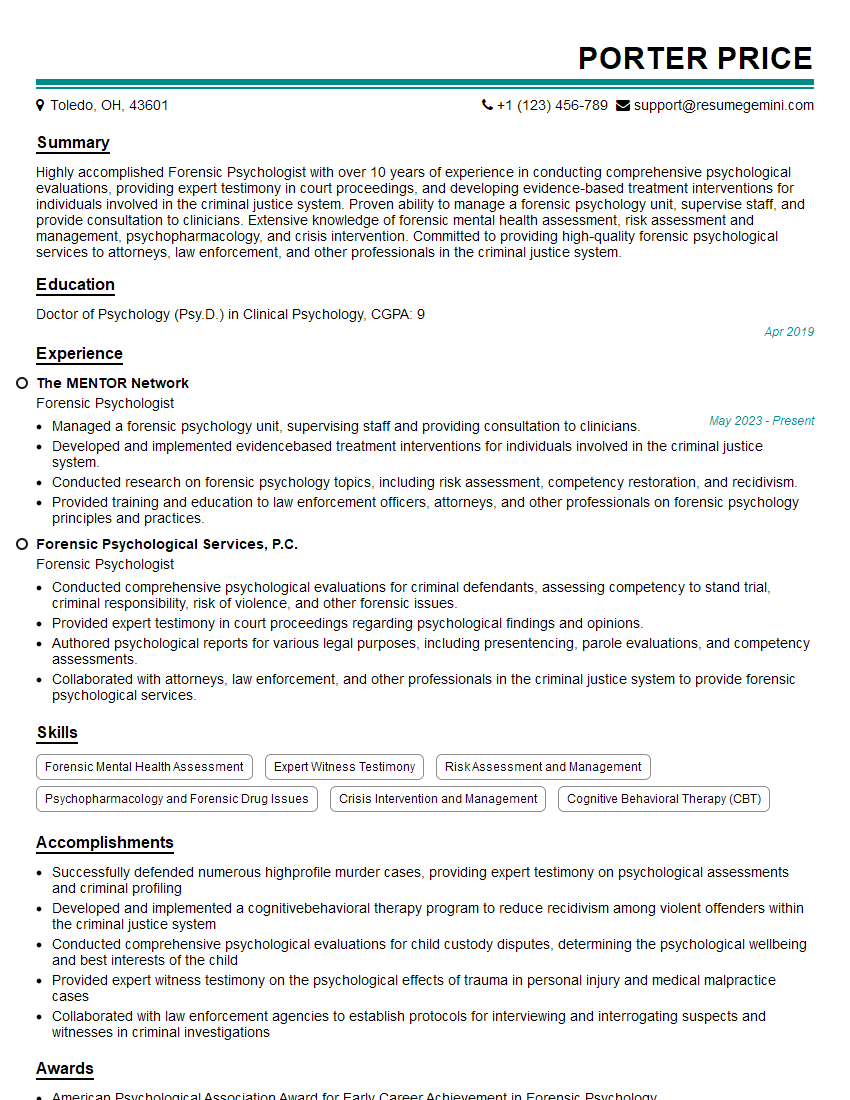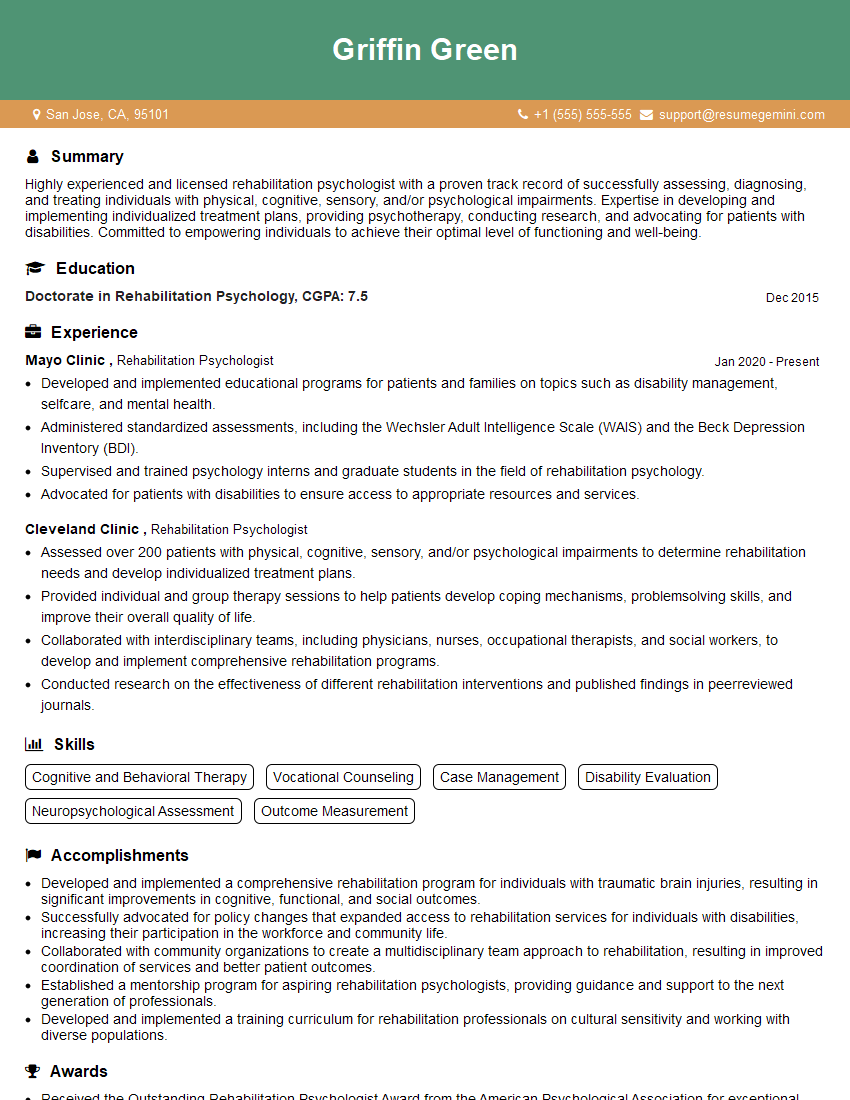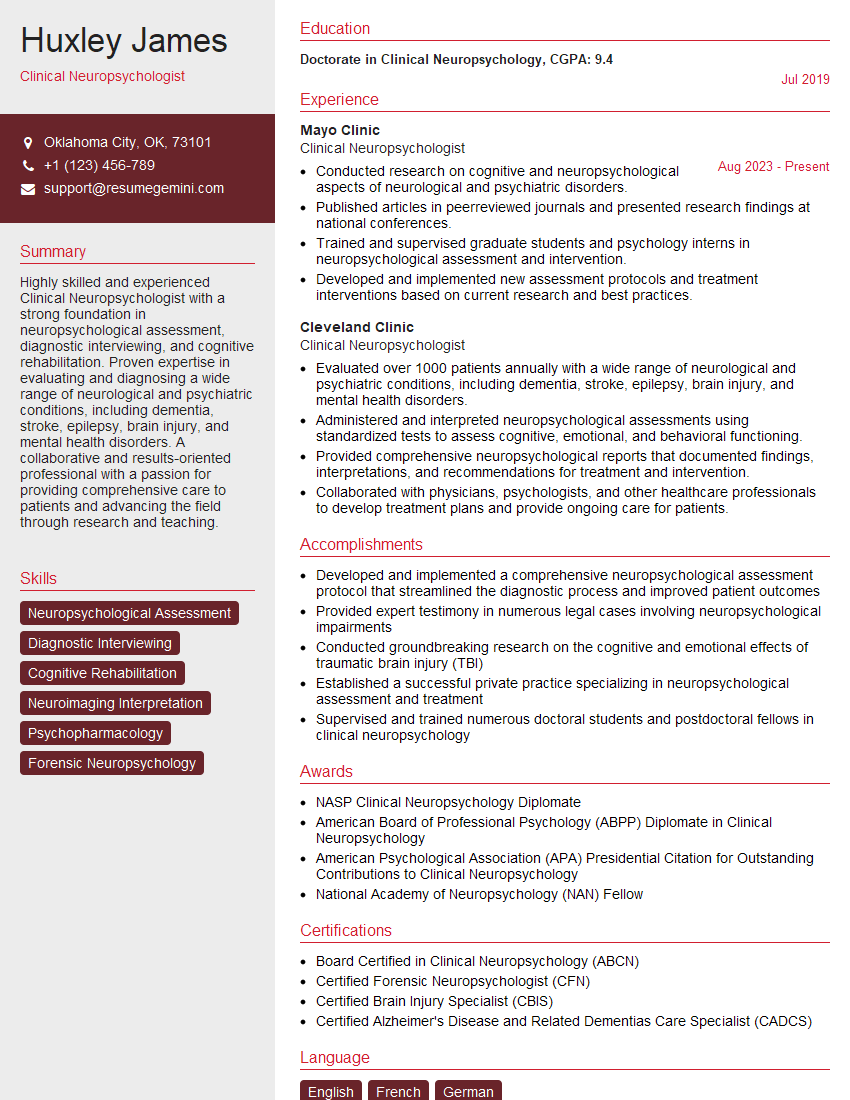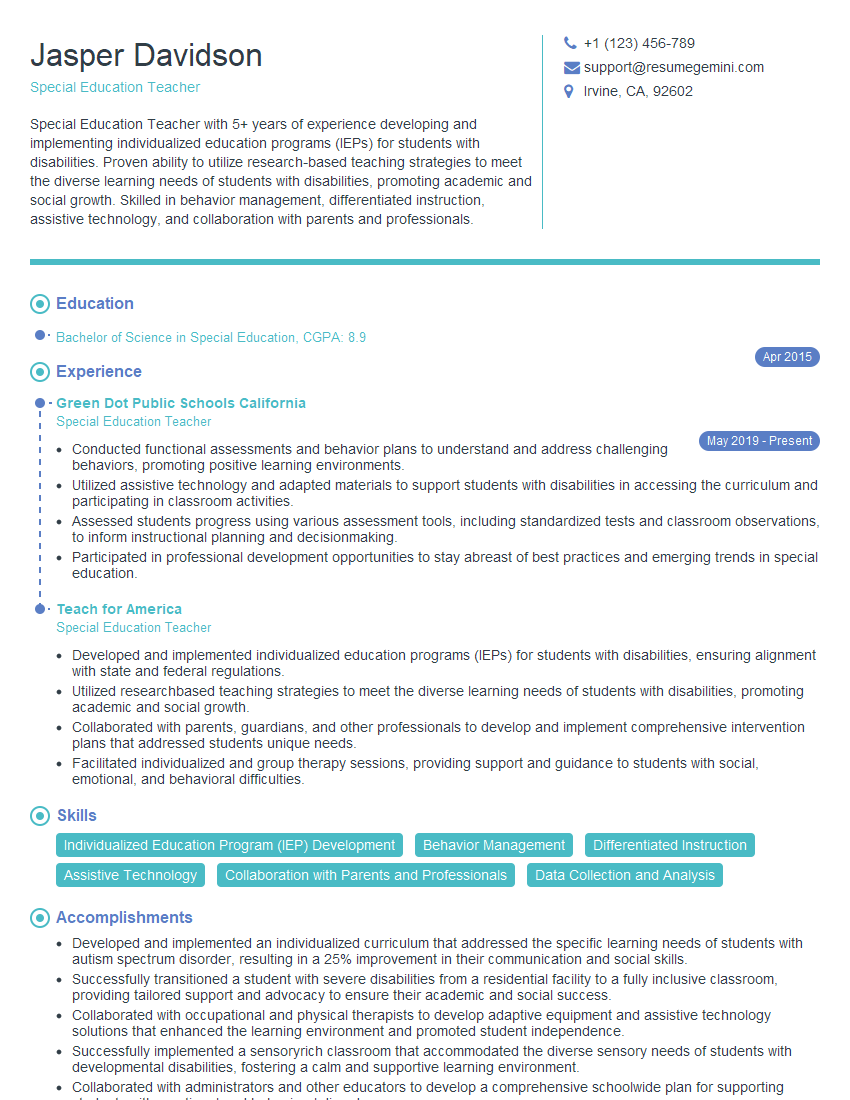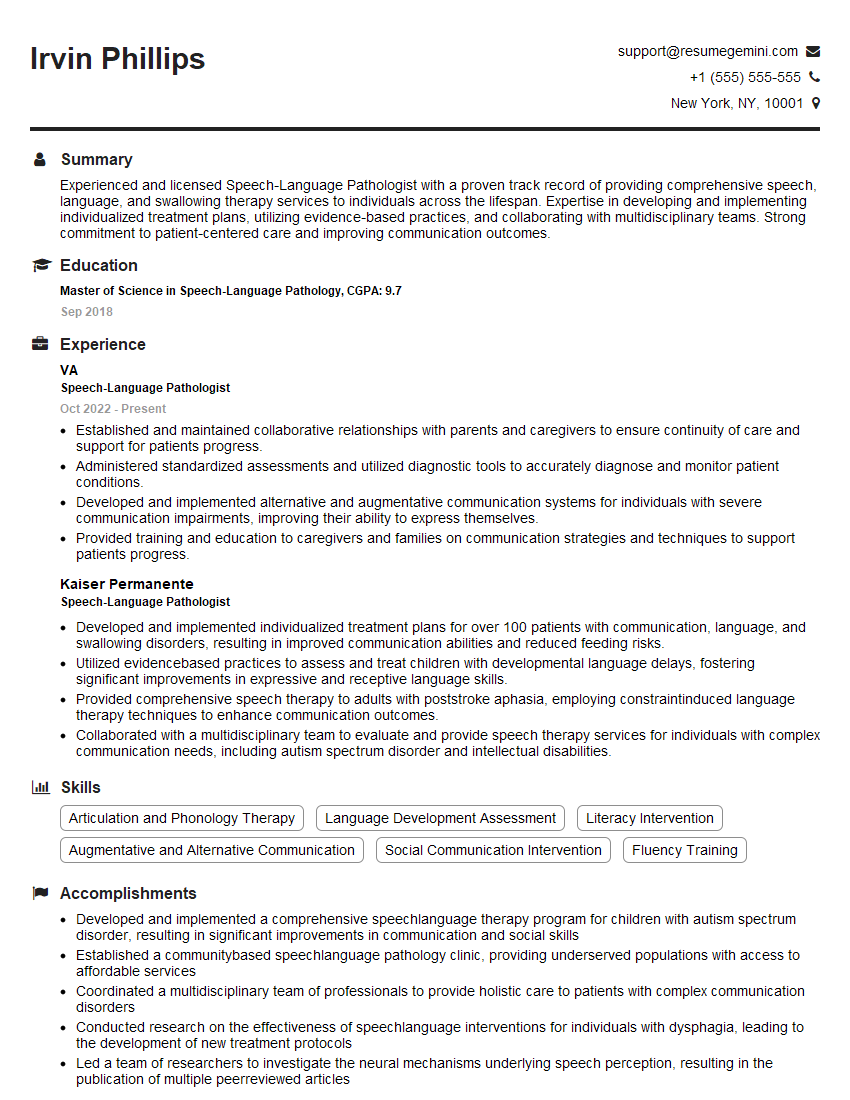Interviews are more than just a Q&A session—they’re a chance to prove your worth. This blog dives into essential Cognitive Assessment and Evaluation interview questions and expert tips to help you align your answers with what hiring managers are looking for. Start preparing to shine!
Questions Asked in Cognitive Assessment and Evaluation Interview
Q 1. Explain the difference between norm-referenced and criterion-referenced assessments.
The core difference between norm-referenced and criterion-referenced assessments lies in what they measure and how they interpret results. Norm-referenced tests compare an individual’s performance to a larger group’s performance, typically a representative sample of the population. Think of it like a race: the norm-referenced test tells you how you did compared to everyone else who ran. Your score is expressed as a percentile rank, a standard score (like an IQ score), or other standardized metrics that indicate your relative standing within the group.
Criterion-referenced tests, on the other hand, assess an individual’s performance against a predefined standard or criterion. This standard represents a specific level of mastery or proficiency in a particular skill or area of knowledge. Imagine a driving test: you either meet the criteria (pass) or you don’t (fail); it doesn’t matter how well everyone else performed. Your score reflects your achievement relative to the set criteria, not relative to others.
In short: Norm-referenced tests focus on relative standing, while criterion-referenced tests focus on absolute performance against a set standard.
Q 2. Describe the process of selecting appropriate cognitive assessment tools.
Selecting appropriate cognitive assessment tools is a critical step and requires careful consideration. It’s a multi-stage process. First, you must clearly define the purpose of the assessment. What specific cognitive abilities are you trying to measure? Are you assessing for learning disabilities, dementia, or something else? This will guide your choice of instruments.
Next, consider the characteristics of the individual being assessed. Their age, educational level, language proficiency, and any potential sensory or physical limitations significantly impact the suitability of different assessments. For instance, a test designed for adults wouldn’t be appropriate for a child.
Then, examine the psychometric properties of the available tests. This includes their reliability (consistency of results) and validity (accuracy in measuring what it intends to measure). You should look for evidence of strong reliability and validity coefficients from research studies. The test manual should clearly outline these properties.
Finally, consider the practical aspects: the test’s administration time, scoring procedures, availability of resources (like trained examiners), and cost. Some tests require specialized training to administer and interpret correctly.
For example, if you’re assessing for dementia in an elderly individual with limited literacy, you might opt for a test with minimal reading requirements and strong visual components, like certain subtests of the Montreal Cognitive Assessment (MoCA).
Q 3. What are the ethical considerations in administering cognitive assessments?
Ethical considerations in administering cognitive assessments are paramount. Confidentiality is crucial: test results should be protected and only shared with authorized individuals or agencies. Informed consent is essential; the individual (or their legal guardian) must understand the purpose of the assessment, the procedures involved, and how the results will be used. They have the right to refuse to participate or withdraw at any time.
Competence is another vital aspect: Only qualified and trained professionals should administer and interpret complex cognitive assessments. Misinterpretation can have serious consequences. Fairness and cultural sensitivity are crucial to avoid biases that could unfairly disadvantage certain individuals. The assessment process should be free of any form of discrimination.
Integrity necessitates accurate administration and scoring, and avoidance of any actions that could compromise the validity of the results. For instance, providing clues or influencing responses during testing would invalidate the results. Finally, responsible use of results is essential. Interpretations should be careful, nuanced, and avoid overgeneralization. Test results are just one piece of information to consider in a broader clinical picture.
Q 4. How do you interpret results from a Wechsler Adult Intelligence Scale (WAIS)?
Interpreting WAIS results involves understanding the various index scores and the full-scale IQ (FSIQ). The WAIS yields several index scores reflecting different cognitive domains: Verbal Comprehension, Perceptual Reasoning, Working Memory, and Processing Speed. Each index score represents an individual’s relative performance in that specific area. For example, a high score in Verbal Comprehension might suggest strong language skills and verbal reasoning abilities.
The FSIQ is a summary score representing overall cognitive functioning. It’s calculated from the index scores. The scores are compared to a normative sample to determine their relative standing, using standard scores with a mean of 100 and a standard deviation of 15. A score of 100 indicates average performance, while scores above 100 reflect above-average performance, and scores below 100 indicate below-average performance.
Interpretation, however, shouldn’t be based solely on the scores. A complete interpretation includes considering the individual’s strengths and weaknesses across different cognitive domains. A profile of subtest scores provides a more nuanced picture of cognitive abilities and potential areas for intervention. A clinician should also consider the context, such as medical history, educational background, and current situation, while arriving at a comprehensive conclusion.
Q 5. Explain the concept of reliability and validity in cognitive assessment.
Reliability refers to the consistency and stability of a test’s results. A reliable test will produce similar scores if administered multiple times under similar conditions to the same individual. Different types of reliability exist, such as test-retest reliability (consistency over time), internal consistency (consistency among items within the test), and inter-rater reliability (agreement between different scorers). Reliability is often expressed as a correlation coefficient, with higher values (closer to 1.0) indicating greater reliability.
Validity, on the other hand, refers to the accuracy of a test in measuring what it claims to measure. A valid test truly assesses the construct of interest. There are different types of validity: content validity (does the test comprehensively cover the content domain?), criterion validity (does the test correlate with other relevant measures?), and construct validity (does the test accurately measure the underlying theoretical construct?).
For example, a test with high reliability might consistently give the same score, but if it doesn’t measure what it’s supposed to measure (low validity), then the consistent scores are meaningless. Both reliability and validity are crucial for ensuring a test provides accurate and meaningful results.
Q 6. How do you address cultural biases in cognitive assessment?
Addressing cultural biases in cognitive assessment is crucial for ensuring fair and equitable evaluation. Cultural biases can manifest in various ways: language barriers, unfamiliar test content, and different cultural interpretations of test items. For example, a test heavily reliant on Western cultural knowledge might disadvantage individuals from other cultures.
Strategies to mitigate cultural biases include using tests that have been standardized on diverse populations, ensuring the test is administered in the individual’s native language, using culturally appropriate materials, and being sensitive to the individual’s cultural background during the assessment process. Furthermore, interpreters should be used when necessary, and the clinician should be aware of potential cultural differences in communication styles and expression.
In addition, clinicians should be trained in cultural competency and be mindful of potential biases in their own interpretations of test results. The focus should be on understanding the individual’s cognitive abilities within their specific cultural context rather than solely comparing them to norms from a potentially different cultural background.
Q 7. Describe different types of cognitive deficits and their assessment.
Cognitive deficits encompass a broad range of impairments affecting various cognitive functions. Examples include:
- Memory deficits: Difficulty remembering new information (anterograde amnesia) or past events (retrograde amnesia). Assessment involves tasks evaluating immediate recall, delayed recall, and recognition memory (e.g., the California Verbal Learning Test).
- Executive dysfunction: Problems with planning, organizing, problem-solving, and inhibiting impulsive behaviors. Assessment often uses tasks involving set-shifting, working memory, and inhibitory control (e.g., the Wisconsin Card Sorting Test).
- Language deficits (Aphasia): Impairment in understanding or producing language. Assessment involves evaluating fluency, comprehension, naming, and repetition (e.g., the Boston Diagnostic Aphasia Examination).
- Visuospatial deficits: Difficulty processing visual information, including spatial perception and constructional abilities. Assessment may include drawing tasks, copying geometric figures, or visual-motor integration tests (e.g., the Rey-Osterrieth Complex Figure Test).
- Attentional deficits: Problems with sustaining attention, selective attention, and divided attention. Assessment involves tasks assessing vigilance, selective attention, and response inhibition (e.g., the Trail Making Test).
Assessment of cognitive deficits typically involves a combination of standardized neuropsychological tests, clinical interviews, and behavioral observations. The specific tests used depend on the suspected deficit and the individual’s characteristics.
Q 8. What are some common cognitive screening tools and their limitations?
Several cognitive screening tools are commonly used to assess cognitive function. These range from brief measures suitable for large-scale screenings to more comprehensive assessments for detailed evaluations. Some examples include the Mini-Mental State Examination (MMSE), Montreal Cognitive Assessment (MoCA), and Saint Louis University Mental Status Examination (SLUMS).
- Mini-Mental State Examination (MMSE): This is a widely used, brief screening tool assessing orientation, memory, attention, and language. Its limitations include a ceiling effect for highly educated individuals and sensitivity to educational level and cultural background. Someone with high premorbid intellectual functioning might score well even with subtle cognitive decline.
- Montreal Cognitive Assessment (MoCA): The MoCA offers a more comprehensive assessment than the MMSE, including visuospatial/executive functions. However, it still has limitations in identifying subtle cognitive deficits, particularly in specific cognitive domains.
- Saint Louis University Mental Status Examination (SLUMS): This test aims to improve upon some of the MMSE’s limitations by providing different scoring based on educational level. Even so, like the MMSE and MoCA, it serves primarily as a screening tool and should not replace a comprehensive neuropsychological evaluation.
In general, the limitations of these screening tools include their brevity, which can prevent thorough assessment of specific cognitive domains. They often lack sensitivity to detect mild cognitive impairment (MCI) or specific types of cognitive deficits. They should be considered a first step, prompting further investigation if needed, rather than a definitive diagnostic tool.
Q 9. How do you differentiate between cognitive impairment and other conditions?
Differentiating cognitive impairment from other conditions requires a thorough assessment encompassing multiple domains. Cognitive impairment, broadly defined as a decline in cognitive abilities interfering with daily life, can result from various causes, including neurodegenerative diseases (Alzheimer’s disease, dementia), traumatic brain injury, stroke, depression, medication side effects, and substance abuse.
The key is to consider the overall clinical presentation. For example, depression can mimic cognitive impairment, presenting with slowed processing speed and difficulty with concentration. However, a detailed history, mood assessment, and response to antidepressant medication can help distinguish the two. Similarly, certain medical conditions like hypothyroidism can affect cognitive function, and addressing the underlying medical condition may improve cognitive performance. Neuropsychological testing helps pinpoint the specific cognitive deficits and their pattern, which can point toward particular etiologies. A comprehensive approach incorporating medical history, physical examination, neuroimaging, and neuropsychological testing is crucial for accurate diagnosis and differential diagnosis.
Think of it like a detective solving a mystery. Each piece of evidence – cognitive test scores, medical history, brain imaging – contributes to the overall picture. We don’t solely rely on one piece of information but put together all the clues to reach a conclusion.
Q 10. Explain the role of cognitive assessment in treatment planning.
Cognitive assessment plays a vital role in treatment planning by providing a detailed profile of an individual’s cognitive strengths and weaknesses. This information is invaluable in tailoring interventions to meet specific needs. For example, if someone is struggling with memory, targeted memory strategies can be implemented. If executive functions are impaired, strategies for organization and planning can be taught.
The results guide the selection of appropriate interventions. For example, a diagnosis of Alzheimer’s disease may lead to a focus on medication management, caregiver support, and environmental adaptations. In contrast, a diagnosis of mild traumatic brain injury might emphasize cognitive rehabilitation therapies aimed at improving attention, processing speed, and memory.
Furthermore, cognitive assessment helps monitor treatment progress. By reassessing cognitive function over time, clinicians can determine the effectiveness of interventions and make necessary adjustments. It provides objective data to measure the impact of treatment and informs decisions about the continuation or modification of the treatment plan.
Q 11. How do you communicate assessment results to clients and their families?
Communicating assessment results is a critical aspect of the process, requiring sensitivity, empathy, and clear communication. I always start by building rapport and creating a safe and supportive environment. I use clear, concise language avoiding jargon, and tailor explanations to the client’s and family’s understanding. Visual aids like graphs and charts can be helpful to illustrate cognitive performance.
I typically summarize the main findings in a way that is easy to understand, highlighting both strengths and weaknesses. I explain the implications of the results for daily functioning, and answer any questions they might have. It’s vital to avoid overly technical language or making definitive diagnoses without proper credentials.
If the results indicate a concerning condition, I provide information and resources about appropriate treatment options and support services. I may collaborate with other healthcare professionals to create a comprehensive care plan that addresses the individual’s specific needs.
I make it a point to provide the client and family with written summaries of the findings and recommendations. This gives them something to refer to after our meeting and facilitates discussions with other healthcare providers.
Q 12. Describe your experience with specific cognitive assessment batteries (e.g., NEPSY, RBANS).
I have extensive experience administering and interpreting several cognitive assessment batteries, including the NEPSY and the RBANS.
- NEPSY (NEuropsychological Assessment for Children): The NEPSY is a comprehensive neuropsychological test battery for children, evaluating various cognitive domains like attention, language, memory, and visuospatial skills. I’ve used it extensively to assess children with suspected learning disabilities, ADHD, and traumatic brain injuries. The detailed subtest scores allow for a precise identification of specific cognitive strengths and weaknesses, leading to more targeted interventions.
- RBANS (Repeatable Battery for the Assessment of Neuropsychological Status): The RBANS is a widely used brief neuropsychological screening tool for adults, evaluating a range of cognitive domains including immediate and delayed memory, visuospatial/constructive skills, language, and attention. I utilize it frequently as a screening tool in my practice and find it useful for monitoring changes in cognitive status over time. Its brevity makes it practical for individuals with limited attention spans or stamina.
My experience encompasses not only administration and scoring but also the interpretation of results within the context of the individual’s background, medical history, and presenting concerns. I carefully consider potential confounding factors and cultural nuances when interpreting the data to ensure accurate and insightful conclusions.
Q 13. What is your experience with administering and scoring neuropsychological tests?
My experience with administering and scoring neuropsychological tests is extensive and spans various populations and settings. I am proficient in administering a wide array of standardized tests, including those assessing memory (e.g., Wechsler Memory Scale), executive functions (e.g., Wisconsin Card Sorting Test), language (e.g., Boston Naming Test), and visuospatial skills (e.g., Rey-Osterrieth Complex Figure Test).
Accurate scoring is paramount. I meticulously follow standardized protocols for administration and scoring, adhering to strict guidelines to ensure reliability and validity. This involves careful attention to detail in recording responses, calculating scores, and interpreting the results in light of normative data. I regularly participate in continuing education to stay updated on best practices in neuropsychological assessment and scoring.
Beyond technical proficiency, interpreting test results requires clinical judgment. I consider the individual’s performance across different tests, as well as their performance in relation to their demographic background and clinical history. This comprehensive approach is essential for reaching accurate and clinically relevant conclusions.
Q 14. How do you manage challenging or uncooperative clients during assessment?
Managing challenging or uncooperative clients during assessment requires flexibility, patience, and a strong understanding of behavior management techniques. I adapt the assessment process to individual needs and preferences, ensuring a comfortable and supportive atmosphere. This might involve adjusting the testing environment, taking frequent breaks, or changing the order of tasks.
For clients with attention difficulties, I might use strategies to enhance engagement, such as incorporating interactive elements or using verbal encouragement. If a client becomes agitated or frustrated, I pause the assessment, address their concerns, and offer reassurance. In cases of severe uncooperativeness, I may consult with other professionals, such as a psychiatrist or behavioral specialist, to develop a collaborative strategy.
Building rapport and establishing trust are crucial. I explain the purpose and procedures of the assessment clearly and answer any questions the client might have. I emphasize the importance of their participation and try to make the experience as positive as possible. Documenting the client’s behavior during the assessment is important for accurate reporting and for informing future assessment strategies.
Q 15. How do you ensure the confidentiality of assessment data?
Confidentiality of assessment data is paramount in cognitive assessment. It’s a cornerstone of ethical practice and legal compliance. My approach is multi-faceted, beginning with secure storage of all data. This includes using password-protected electronic databases with access limited to authorized personnel only, and physically securing paper records in locked cabinets. Beyond storage, I follow strict anonymization procedures, replacing identifying information with codes wherever possible. Data is never shared without explicit, informed consent from the client or their legal guardian. I’m meticulous in adhering to HIPAA and other relevant privacy regulations, ensuring that all my practices align with best practice guidelines within the field.
For example, when working with a school district, I ensure that only relevant staff, such as the student’s teachers, special education coordinator and school psychologist, have access to the relevant portions of the assessment reports that directly pertain to their educational planning. Parent consent is always obtained prior to any data sharing.
Career Expert Tips:
- Ace those interviews! Prepare effectively by reviewing the Top 50 Most Common Interview Questions on ResumeGemini.
- Navigate your job search with confidence! Explore a wide range of Career Tips on ResumeGemini. Learn about common challenges and recommendations to overcome them.
- Craft the perfect resume! Master the Art of Resume Writing with ResumeGemini’s guide. Showcase your unique qualifications and achievements effectively.
- Don’t miss out on holiday savings! Build your dream resume with ResumeGemini’s ATS optimized templates.
Q 16. Describe your experience working with diverse populations.
My experience working with diverse populations is extensive. I’ve worked with individuals from a wide range of cultural backgrounds, socioeconomic statuses, and abilities. Understanding cultural nuances is crucial for accurate assessment. For example, I’ve adapted my approach to account for linguistic differences, utilizing interpreters when necessary and selecting culturally appropriate assessment materials. I’m adept at recognizing and mitigating potential biases inherent in some standardized tests, ensuring the assessment accurately reflects the individual’s cognitive abilities rather than reflecting cultural or linguistic disparities. I also consider potential influences of socioeconomic factors on cognitive development and test performance. This inclusive approach is fundamental to providing equitable and valid assessments.
In one instance, I worked with a refugee family who spoke little English. To overcome this, I utilized a bilingual interpreter and selected nonverbal assessment tools to gather a comprehensive evaluation, focusing on observation and performance rather than relying solely on verbal responses.
Q 17. What is your experience with interpreting cognitive test results in different age groups?
Interpreting cognitive test results requires a nuanced understanding of developmental norms across different age groups. For children, interpretation considers developmental milestones and age-related cognitive changes. For example, performance on a memory task will be interpreted differently for a 5-year-old than for a 15-year-old. With adults, interpretation may focus on detecting cognitive decline related to age or neurological conditions, such as dementia. I’m experienced in utilizing age-appropriate norms and considering the impact of developmental factors and potential age-related changes to cognitive function. This includes understanding the limitations and strengths of various tests across the lifespan and accounting for such factors in interpretation and report writing.
For instance, a low score on a verbal fluency test for an elderly individual might be interpreted differently than a low score for a young adult. Age-related cognitive decline may need to be ruled out with the elderly client. I’m trained to utilize standardized scoring and interpret results within their proper context.
Q 18. How do you integrate cognitive assessment data with other relevant information?
Integrating cognitive assessment data with other relevant information is crucial for a holistic understanding of an individual’s functioning. I never rely solely on cognitive test scores; I consider a wide range of information to provide a comprehensive picture. This includes medical history (e.g., neurological conditions), educational records (e.g., academic performance), behavioral observations (e.g., attention span and impulsivity), and information gathered from interviews with the individual, family members, and other professionals. A collaborative approach involving all relevant stakeholders aids in ensuring a complete and accurate picture of the individual’s functioning.
For example, if a child scores low on a visual-spatial task, I wouldn’t jump to conclusions. I’d consider their classroom behavior, if they have any visual impairments, and any reported learning disabilities before making any recommendation.
Q 19. What are your strategies for maintaining accuracy and minimizing errors in assessment?
Maintaining accuracy and minimizing errors in assessment is a priority. My strategies include meticulous adherence to standardized test administration procedures. I carefully follow the manual’s instructions, ensuring proper timing, scoring, and recording of responses. I regularly review and update my knowledge of best practices. I also maintain a high level of professional competence by participating in continuing education and seeking supervision when needed. To reduce scoring errors, I use double-checking techniques where possible and document the entire assessment process thoroughly.
For instance, I use checklists to ensure I haven’t missed any steps in the assessment process. I also regularly attend workshops and conferences to remain up-to-date with the latest research on assessment techniques and scoring methodologies.
Q 20. How do you stay current with the latest advancements in cognitive assessment?
Staying current with advancements in cognitive assessment is an ongoing process. I actively participate in professional development activities, attending conferences and workshops, and reading relevant journals and publications such as the Journal of Clinical and Experimental Neuropsychology and the Archives of Clinical Neuropsychology. I maintain memberships in professional organizations like the National Academy of Neuropsychology, which offer continuing education opportunities and access to the latest research and best practices in the field. Staying abreast of new assessment tools and updated normative data is essential for providing the most accurate and effective assessments.
I also utilize online resources, such as professional databases and reputable websites, to stay informed about new research and updates in the field of cognitive assessment.
Q 21. Describe a situation where you had to adapt an assessment to meet the needs of a client.
In one case, I was assessing a young adult with a severe anxiety disorder who struggled to complete a traditional neuropsychological test battery due to high levels of test anxiety. Simply proceeding as usual would have yielded inaccurate and unreliable results. To address this, I adapted the assessment by breaking down the testing sessions into shorter, more manageable periods. We implemented frequent breaks, and I used positive reinforcement and encouragement to build their confidence. I also selected alternative assessment measures that were less anxiety-provoking. This flexible and individualized approach ensured a more accurate assessment of their cognitive abilities while minimizing the impact of their anxiety.
This adaptation involved careful consideration of the client’s individual needs and the ethical implications of modifying a standardized test. I made sure to document all alterations in my report and carefully interpreted the results in light of the assessment adaptations.
Q 22. How do you handle discrepancies between different assessment measures?
Discrepancies between assessment measures are common and require careful consideration. They can arise from various sources, including the specific tests used, the individual’s performance on a given day (influenced by factors like fatigue or anxiety), and even the examiner’s administration techniques. Instead of dismissing the discrepancy as an error, I investigate potential reasons.
- Test Characteristics: Different tests assess different cognitive aspects. A discrepancy might reflect strengths in one cognitive area and weaknesses in another, rather than an error in measurement. For example, a person might score highly on verbal fluency but lower on visuospatial reasoning.
- Individual Variability: Cognitive performance isn’t static. A person might perform differently based on their emotional state, sleep quality, or even the time of day. If a significant discrepancy exists between two assessments taken on different days, I’d explore potential contributing factors.
- Methodological Issues: Examiner bias, unclear test instructions, or even a testing environment that was too noisy or distracting can impact performance and create discrepancies. Reviewing the testing conditions is crucial.
My approach involves a thorough review of the assessment data, including the tests used, administration procedures, and the individual’s background. I might use a pattern analysis to understand the consistency of performance across related cognitive domains. For example, if there are consistent weaknesses in multiple tests assessing working memory, it points towards a more significant concern than if the low score was isolated to a single test. Ultimately, a comprehensive interpretation considers the entire profile of results, rather than focusing solely on isolated discrepancies.
Q 23. Explain the impact of various factors (e.g., fatigue, anxiety) on cognitive performance.
Various factors significantly impact cognitive performance. These factors can be broadly categorized as internal (relating to the individual) and external (relating to the testing environment).
- Internal Factors:
- Fatigue: Exhaustion leads to reduced attention, concentration, and processing speed. Imagine trying to solve complex math problems after a long day—your performance would likely be compromised.
- Anxiety: High levels of anxiety can impair working memory, increase error rates, and negatively affect cognitive flexibility. A test-taker experiencing significant anxiety might struggle to recall information, even if they know it.
- Medication: Certain medications can have cognitive side effects, impacting areas like memory, attention, and processing speed.
- Health Conditions: Underlying medical conditions, such as sleep disorders or neurological issues, can dramatically impact cognitive function.
- External Factors:
- Testing Environment: A noisy or uncomfortable testing environment can be distracting, leading to reduced performance.
- Time of Day: Cognitive performance often fluctuates throughout the day, with peak performance typically occurring in the late morning or early afternoon.
- Test Instructions: Unclear instructions can confuse test-takers, leading to incorrect responses or incomplete attempts.
Understanding these factors is paramount. In clinical practice, I always consider these potential influences when interpreting cognitive test results. For instance, if a client shows significant impairment in one area but exhibits normal performance in other areas, I will inquire about potential influencing factors, such as medication side effects or recent stressful life events, before drawing firm conclusions.
Q 24. What are the limitations of using only cognitive tests to understand an individual’s functioning?
While cognitive tests provide valuable insights into an individual’s cognitive strengths and weaknesses, relying solely on them to understand functioning is insufficient. Cognitive tests offer a limited snapshot, failing to capture the full complexity of human behavior.
- Lack of Real-World Context: Cognitive tests are often decontextualized, failing to assess how cognitive abilities translate into real-world performance. Someone might perform poorly on a memory test but demonstrate excellent memory skills in daily life scenarios.
- Limited Scope: Cognitive tests predominantly assess specific cognitive domains, such as memory and attention. They don’t comprehensively address other crucial aspects of functioning, such as motivation, emotional regulation, or social skills.
- Cultural Bias: Some tests might not be culturally appropriate or sensitive, leading to inaccurate or biased results, especially in diverse populations. If the test uses language or cultural references unfamiliar to the individual, it will not be a fair assessment.
- Subjectivity: While attempts are made to standardize testing procedures, subtle variations can occur due to examiner influence or situational factors.
A comprehensive understanding of an individual’s functioning necessitates a multifaceted approach incorporating various data sources, including interviews, observations of behavior in natural settings, and information from family members or other informants. This holistic approach provides a far richer and more accurate picture than cognitive tests alone can offer.
Q 25. How do you use cognitive assessment to inform educational interventions?
Cognitive assessment plays a crucial role in informing educational interventions. By identifying specific cognitive strengths and weaknesses, we can tailor educational strategies to optimize learning outcomes.
- Identifying Learning Disabilities: Cognitive assessments can help diagnose specific learning disabilities, such as dyslexia or ADHD, which often impact academic performance. The results inform interventions tailored to address the identified challenges.
- Developing Individualized Education Programs (IEPs): Assessment results are essential for creating effective IEPs. They highlight the student’s needs and guide the development of individualized learning strategies and support services.
- Targeting Instruction: Cognitive assessments allow educators to understand a student’s cognitive profile, guiding instruction towards their strengths while providing appropriate support for areas of weakness. For example, a student with strong visual-spatial skills might benefit from visual learning materials, while a student with weaker working memory may need strategies to improve information retention.
- Monitoring Progress: Cognitive assessments can be used to track a student’s progress over time, allowing educators to evaluate the effectiveness of interventions and adjust strategies as needed.
For instance, a student struggling with reading comprehension might demonstrate weaknesses in phonological processing (sound awareness) and working memory as revealed through cognitive testing. Based on these findings, interventions could focus on phonics instruction and strategies to improve working memory capacity, such as chunking information or using mnemonic devices.
Q 26. Describe your experience with using technology in cognitive assessment.
Technology has significantly advanced cognitive assessment, offering both advantages and challenges. I have extensive experience using technology-based assessment tools.
- Computerized Adaptive Testing (CAT): CAT adapts the difficulty of test items based on the individual’s performance, resulting in more efficient and accurate assessments. It is particularly useful when time is limited or when a wide range of cognitive abilities needs to be assessed.
- Online Platforms: Online platforms provide easy access to a wider range of assessments and offer automated scoring and reporting features. They allow for more flexibility in terms of administration, making assessments more convenient for both clients and clinicians.
- Neuropsychological Software: Sophisticated software packages provide detailed analysis of cognitive test data, helping to identify patterns and generate comprehensive reports. This can help me spot subtle changes in functioning that might otherwise be missed.
- Virtual Reality (VR) Assessments: VR offers immersive environments that allow for more ecologically valid assessments. For example, VR can simulate real-world scenarios to evaluate executive functions like decision-making or spatial navigation.
However, I am aware of the challenges. Ensuring test security, maintaining the integrity of the testing environment, and addressing potential disparities in access to technology are all important considerations. It’s crucial to select technology-based assessments carefully, considering their psychometric properties and ensuring they meet the specific needs of the client.
Q 27. What is your approach to documenting and reporting assessment findings?
Comprehensive documentation and reporting are critical to ensure clarity, accuracy, and ethical practice. My approach involves a multi-step process.
- Detailed Record Keeping: I maintain detailed records of the assessment process, including the tests administered, the date and time of testing, and any observations made during the assessment. This allows for a transparent and auditable record of the entire process.
- Structured Reporting: I utilize a structured format for reporting results, ensuring consistency and clarity. The report includes a summary of the referral question, background information, test results (including raw scores, scaled scores, and percentile ranks), and an interpretation of the findings.
- Clear and Concise Language: I write reports using clear and concise language that is easily understandable by both clinicians and non-clinicians. Jargon is minimized, and technical terms are clearly defined.
- Visual Aids: Graphs and tables are used to present complex data in an accessible manner. Visual aids help readers quickly grasp the overall cognitive profile.
- Recommendations: The report includes specific, actionable recommendations based on the assessment findings. These recommendations are tailored to the individual’s specific needs and context.
I ensure that the reports are well-organized, easy to read, and free from ambiguity. The goal is to present the information in a way that is both informative and actionable for the client, their family, and any relevant professionals involved.
Q 28. How would you explain the results of a cognitive assessment to someone without a clinical background?
Explaining complex cognitive assessment results to someone without a clinical background requires careful consideration and clear communication. I use analogies and plain language to make the information accessible.
I start by explaining the purpose of the assessment, emphasizing that it’s a way to understand how different cognitive skills work together. Instead of using technical jargon like ‘working memory’ or ‘executive functions,’ I might use everyday language, such as, “We tested your ability to hold information in your mind while doing something else,” or “We looked at your ability to plan, organize, and switch between tasks.”
I then present the results in a simplified way, focusing on the main findings. For example, instead of stating a specific percentile rank, I might say something like, “Your results show that your processing speed is within the average range, while your memory skills are slightly below average.” I use visual aids, like charts or graphs, to illustrate the results and make them easier to understand.
Finally, I explain the implications of the findings in terms of daily life. If someone has difficulty with attention, for example, I would talk about how that might affect their ability to focus at work or school. The goal is to ensure that the person leaves the explanation feeling informed, empowered, and confident in their ability to understand and act upon the information provided.
Key Topics to Learn for Cognitive Assessment and Evaluation Interview
- Neuropsychological Assessment: Understand the principles and procedures involved in assessing cognitive functions like memory, attention, and executive functions. Consider various assessment tools and their limitations.
- Cognitive Models and Theories: Familiarize yourself with prominent cognitive models (e.g., information processing, working memory) and how they inform assessment practices. Be prepared to discuss their strengths and weaknesses.
- Assessment Interpretation and Report Writing: Practice interpreting assessment data, drawing valid conclusions, and writing comprehensive and concise reports that clearly communicate findings to relevant stakeholders.
- Ethical Considerations in Assessment: Understand the ethical guidelines and best practices related to administering, interpreting, and reporting cognitive assessments. Discuss issues of cultural fairness and bias.
- Practical Application: Be ready to discuss how cognitive assessments are used in various settings (e.g., clinical, educational, forensic) and the implications of assessment findings for intervention and treatment planning.
- Specific Assessment Tools: While not memorizing every test is necessary, familiarize yourself with commonly used cognitive assessment tools and their applications. Focus on understanding the underlying principles rather than rote memorization.
- Differential Diagnosis: Be prepared to discuss how cognitive assessment helps differentiate between various cognitive disorders and conditions.
- Data Analysis and Statistical Concepts: Understand basic statistical concepts relevant to interpreting assessment data, such as measures of central tendency and variability.
Next Steps
Mastering Cognitive Assessment and Evaluation opens doors to rewarding careers in diverse fields, offering significant professional growth and opportunities for impact. A strong resume is crucial for showcasing your skills and experience to potential employers. Creating an ATS-friendly resume increases your chances of getting noticed by recruiters. To build a compelling and effective resume, we recommend using ResumeGemini, a trusted resource for crafting professional resumes tailored to your specific career goals. Examples of resumes specifically designed for candidates in Cognitive Assessment and Evaluation are available to help you get started.
Explore more articles
Users Rating of Our Blogs
Share Your Experience
We value your feedback! Please rate our content and share your thoughts (optional).
What Readers Say About Our Blog
This was kind of a unique content I found around the specialized skills. Very helpful questions and good detailed answers.
Very Helpful blog, thank you Interviewgemini team.
